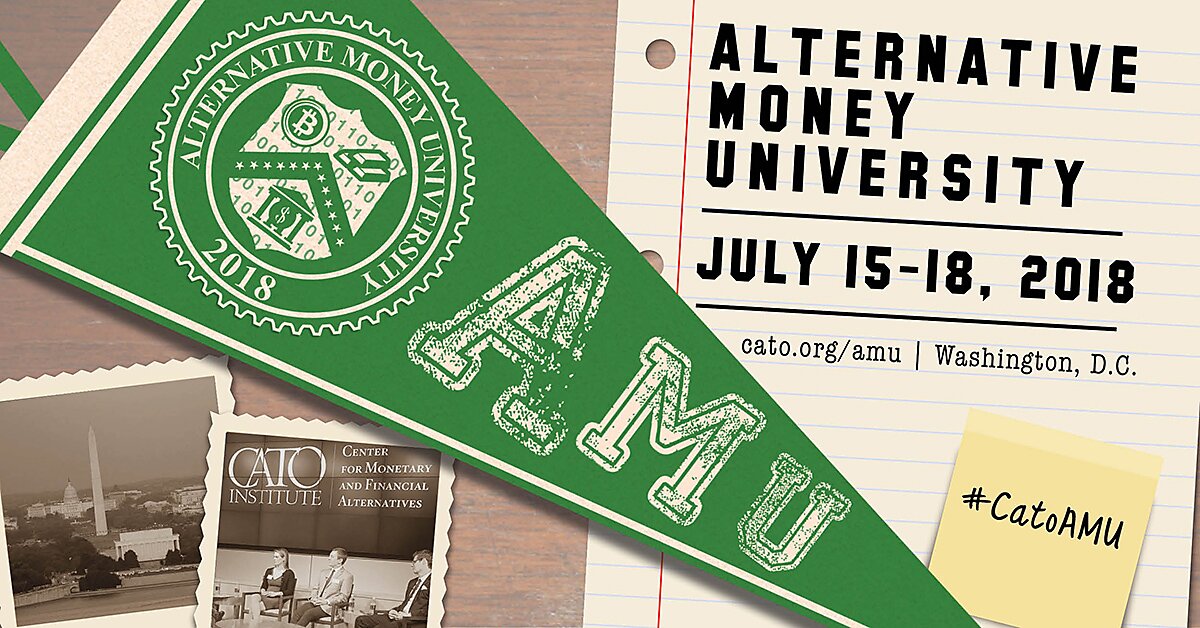A decade since the disruptive 2008 financial crisis, it is more important than ever for young economists to understand monetary economics, which often requires seeking knowledge beyond what ordinary economics classes have to offer. The past ten years have been witness to extraordinary changes in the conduct of monetary policy, including quantitative easing by the Federal Reserve and European Central Bank, and experiments with negative interest rates by the central banks in Japan, Sweden, Switzerland, and Denmark. At the same time, the growing prominence of decentralized, non-state cryptocurrencies has begun to challenge official currency monopolies. Their rapid penetration of mainstream consciousness means that an understanding of their implications for monetary policy and finance is becoming increasingly important. Every aspiring student of monetary economics should understand both existing monetary arrangements and how alternatives might improve upon them.
Alternative Money University will help 30 qualified students to develop such an understanding by participating in an intensive academic workshop about monetary history, the theory and practice of monetary policy, and the workings of unconventional monetary arrangements. By the end of the 3‑day workshop, students will be better equipped to evaluate current monetary policy events as they unfold, to think critically about existing monetary arrangements, and, ultimately, to contribute themselves to the field of monetary economics.
Students in or entering their last year of undergraduate or beginning years of graduate studies are invited to apply. Successful applicants will be chosen on the basis of their academic records and demonstrated interest in monetary economics.
Those chosen to take part will attend, free of charge (with hotel and travel expenses covered by the Cato Institute), several thought-provoking academic seminars led by top scholars in the field. This year’s seminars will include:
- “The Evolution of Money and Banks,” taught by George Selgin, the director of Cato’s Center for Monetary and Financial Alternatives and professor emeritus of economics at the University of Georgia.
- “The Economics of Commodity Money (and Bitcoin),” taught by Lawrence H. White, professor of economics at George Mason University and senior fellow at the Cato Institute.
- “The Role of Monetary Policy in the Great Recession,” taught by David Beckworth, senior research fellow in the Program on Monetary Policy at the Mercatus Center at George Mason University and host of the Macro Musings podcast.
- “Monetary Rules vs. Discretion,” taught by, Scott Sumner, Ralph G. Hawtrey Chair of Monetary Policy and director of the Program on Monetary Policy at the Mercatus Center at George Mason University, and professor emeritus at Bentley University.
If you wish to apply, or to learn more about the program, visit www.cato.org/amu. Applications are open until January 31, 2018.
Disclaimer
This post was originally published at Alt‑M.org. The views and opinions expressed here are those of the author(s) and do not necessarily reflect the official policy or position of the Cato Institute. Any views or opinions are not intended to malign, defame, or insult any group, club, organization, company, or individual.
All content provided on this blog is for informational purposes only. The Cato Institute makes no representations as to the accuracy or completeness of any information on this site or found by following any link on this site. Cato Institute, as a publisher of this article, shall not be liable for any misrepresentations, errors or omissions in this content nor for the unavailability of this information. By reading this article and/or using the content, you agree that Cato Institute shall not be liable for any losses, injuries, or damages from the display or use of this content.


